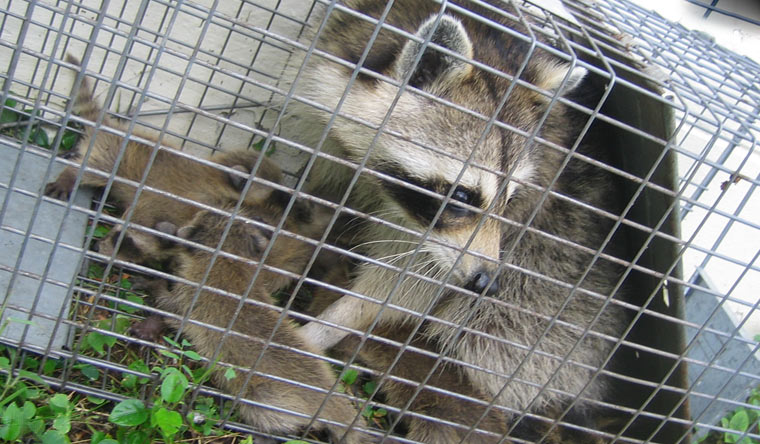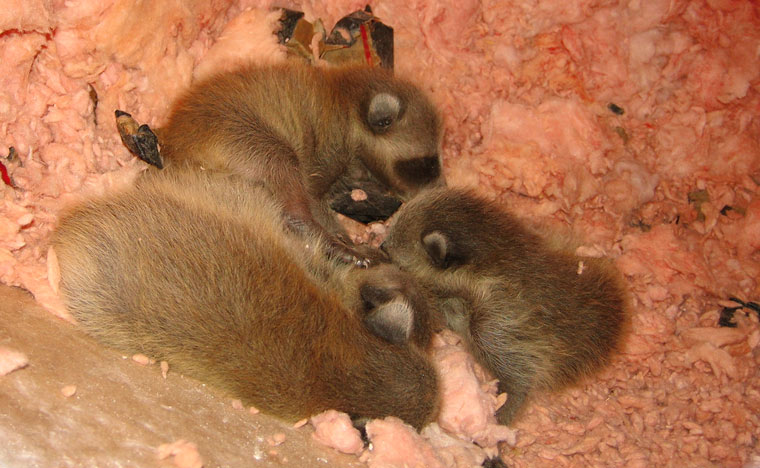-
info@aaanimalcontrol.com
Call us for help in your town
Humane Wildlife Education
Are Female Raccoons Good Mothers?
Need raccoon removal in your hometown? We service over 500 USA locations! Click here to hire us in your town and check prices - updated for year 2020.
When it comes to being a good mother, too often human beings believe that they are the only animals that are capable of such behavior. There seems to be a level of arrogance that has decided that other species of animals simply don't pay the same amount of attention or provide the same amount of concern for their babies as we do. To be honest, that is absolute hogwash.

Take the raccoon for example. If you are wondering if female raccoons make good mothers then you should be made aware that they are. Raccoons can make fantastic mothers to their young, providing them with the proper amount of nurturing and care that they need to grow and be able to thrive as adults.
From the time that the mother raccoon knows that she is pregnant, she will begin a ritual of trying to prepare a safe and secure place in which her babies can be born. This can mean searching for such places as a person's attic or shed, because she knows that this can provide a safe refuge where she can have the babies and not have to worry about them being disturbed too much of a degree.
Once they are born, she will nurse them from her teats so that the babies can get the proper amount of care and nourishment that they need. Baby raccoons, like the babies of most mammals, are quite helpless when they are born and are in need of very tender and significant amount of care. The mother raccoon dedicates herself to ensuring that they do get the care and concern that they need.
Learn whether or not raccoons hibernate.
As the raccoon attic babiesgrow older, she continues to watch over them as they start to develop hair and claws. She will assist them to be able to learn how to trap and capture food, how to avoid predators, and also prepare them for other aspects of adulthood.
When they are ready to leave, the mother sends them on their way fully aware that she has prepared them to be able to move out into the wilderness. While some may find it calloused that she does not continue to stay in touch with them or to keep them as part of her family, the truth is that this is not an instinctual behavior of the mother raccoon. She will care for the animals and tell they are old enough to be able to care for themselves, and then her work is done.
Find out all you need to know about raccoon feces.
The next year, she will prepare to have another set of young. She will go through the entire process of bringing them into this world, caring for them, and releasing them out on their own once they have become adults. It is the circle of life that helps to keep the raccoon population moving forward, and demonstrates that mother raccoons are not only good in helping their babies to prepare for the future, but also in knowing that they have done the right things for their babies to be able to succeed once they become adults.
Do Female Raccoons Make Good Mothers?
Need raccoon removal in your hometown? We service over 500 USA locations! Click here to hire us in your town and check prices- updated for year 2020.
Female raccoons are generally left to their own devices once pregnant, with the father have no or very little interaction once the deed has been done, so to speak. This means that female raccoons need to be good mothers in order to ensure her kits will survive. She'll need to find a good nesting spot, as well as build a nest. Then she'll need to find enough food to keep herself and her youngsters in milk for a while, plus provide them with real, solid foods a bit later on, before they're old enough to do that kind of thing for themselves.

These kits are helpless for the first two to four weeks of their lives. They don't even open their eyes until they are about three weeks of age, and it can be up to six weeks before they've even figured out how to stand. The mother will need to not only keep them safe in the nest, but also find enough food to support her new family, all at the same time. The kits wouldn't be able to protect themselves from predatory attacks, or find food.
It won't be until the kits are about three months of age that the female mother raccoons will wean them, although some do start a bit earlier, at about two months of age.
If she needs to move her youngsters in this time, she'll do so one by one, carrying them in her mouth, from the old location to the next. This will often happen when predators are around, or when humans use predatory repellents, such as wildlife eviction fluid. She will be vicious too, protecting herself and her babies at all costs, and that includes towards humans as well as to other animals.
It won't be until the raccoon youngsters are about five or six months of age that they will leave the den to go and forage and hunt for food other own, and before that time, the mother will have done smaller trips with them to teach them all the skills she has. The length of time that the mother will stay with her young will depend on the time of year. It is generally considered the norm for mothers to stay with her kits for at least the first winter, and in many cases, it's not until they are between 10 and 12 months old that they leave and do their thing alone.
Females can sometimes stay with their mothers for a little longer than the males do, the latter being more independent from an early point. Males tend to move further away from the original nesting spots with their mothers, with females staying close, for a little while at least.
Female raccoons make excellent mothers, and are a force to be reckoned with!
How to Care for an Orphaned Baby Wild Raccoon
Need raccoon removal in your hometown? We service over 500 USA locations! Click here to hire us in your town and check prices- updated for year 2020.
There are several reasons why you should not handle a wild raccoon that you find in your back garden or anywhere else.

1 - You are running the risk of injuring the raccoon kit. They are fragile, tiny animals, and what might seem like a gentle and light touch to you might actually be a crushing blow. If the raccoon baby is already injured, you run the risk of causing further injury.
2 - You will create an orphaned baby when there isn't one, by getting involved unnecessarily. If the mother comes back for her young but you have moved it, she won't know how to find it. She might keep on the trail for a while, but there's a good chance she will lose the scent and, in turn, her young.
3 - There are some reports that human scent on a raccoon youngster could be enough to make the mother of the kit abandon her baby, but the evidence seems inconclusive either way. We recommend that you do not touch a wild baby raccoon (or other wild/pest animal) just in case this happens. Again, if that baby wasn't orphaned and the mother did come back for it, she may refuse to take it with her once it no longer smells like hers. There is a chance that she might not recognise the kit.
4 - The kit might be injured or sick and has been abandoned by its mother. If you then try to save that baby raccoon, you could prolong an inevitable death that will, no doubt, be uncomfortable or painful. Sadly, as much as we would like to, we can't save every animal that we come across, no matter how cute or adorable it might look. Nature will do its thing. Sometimes, it's not very pleasant.
5 - Do you know how to care for a raccoon? Do you know how to care for a baby raccoon? At what age do the kits stop drinking their mother's milk and start eating solid foods? What solid foods do they eat? What can you use as a substitute as raccoon milk if the kits are too young to eat solid food? There are far too many questions, many of which you won't have the answers to. You can look this information up on the internet, of course, but it doesn't always help. What if you don't have those necessary items to hand?
6 - Do you know what diseases raccoons can both carry and transmit? Rabies is one of them, something that your orphaned baby raccoon could be carrying. The virus is easily passed on in the saliva and other body fluids of the animals, and it doesn't take much for that virus to find its way into your bloodstream. A little nip from a baby raccoon might not seem like much, but when you find yourself faced with a rabies diagnosis, you might have wished you'd just let nature take its course with that baby raccoon. Just so you know; there are plenty of diseases linked to raccoons, many of which can affect humans, pets, and wild/farm animals alike.
We don't recommend that you get close to a wild baby raccoon, whether it looks to have been orphaned or not. We definitely don't recommend that you feed wild animals, especially baby raccoons. Feeding these wild creatures is what causes the problem in the first place, whether you have realised the root of the problem or not. Deliberately feeding them wouldn't be a smart idea, not even raccoon kits.
For more information, you may want to click on one of these guides that I wrote:
How much does raccoon removal cost? - get the lowdown on prices.
How to get rid of raccoons - my main raccoon removal info guide.
Example raccoon trapping photographs - get do-it-yourself ideas.
Raccoon job blog - learn from great examples of raccoon jobs I've done.
Raccoons in the attic - read about what to do.
Baby Raccoons: What to Look For
Understanding Raccoon Mating


















